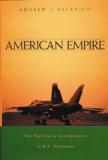Power for Power's Sake?
The fall of the Berlin Wall in 1989 signaled the end of the policy of containment that had guided American foreign policy during the cold war. Some commentators declared the Soviet demise to be the end of history and faulted presidents George H. W. Bush and Bill Clinton as bunglers. They missed an exquisite opportunity, so goes the argument, to conceive and champion a new Big Idea, a nonreactionary statesmanship in communism’s aftermath.
According to Andrew J. Bacevich, director of the Center for International Relations at Boston University, the foreign policies of Bush Sr., Clinton and now Bush Jr. represent less bungling, and more continuity with the existing Big Idea rooted in the Truman era. Indeed, rather than being the uncertain moves of a reluctant superpower, U.S. foreign policy in the post-Soviet era is aptly described as the projection of American Empire.
The essence of empire is so-called global openness. It is not just about the removal of barriers that inhibit the movement of goods, capital, ideas and people. It is also about the creation of an integrated international order, in which the United States positions itself to function as ultimate guarantor of order and enforcer of norms.
In March 1947, President Harry Truman enunciated what came to be known as the Truman Doctrine, as a consequence of the British pullback from southeastern Europe and the Near East, leaving Greece and Turkey vulnerable to Soviet advances. Truman framed the impending crisis not as a regional problem, but as a global challenge. History, he told Congress, had reached a turning point at which nearly every nation must choose between alternative ways of life. Left unchecked, the yoke of Communist totalitarianism would yield a growing number of regimes resorting to terror and oppression, a controlled press and radio, fixed elections, and the suppression of personal freedoms.
Only the United States, Truman asserted, could stem this tide. We have the mechanical facilitiesthe radio, television, airplanes for the creation of a worldwide culture. That same year, on Independence Day, Truman completed the blueprint for a new worldwide culture with America at the helm. He offered two problematics to which America had to respond. One was that nations are interdependent; the other, that peace is indivisible. Global interdependence calls mankind to the joint pursuit of life, liberty and the pursuit of happiness, he said. Indivisibility binds the world’s peoples such that So long as the basic rights of men [anywhere] are denied...men everywhere must live in fear of...their own [in]security.
The international order he envisioned embraced the full exchange of knowledge, ideas, and information, and maximum freedom in international travel and communication. To make it a reality, he said, the United States must take the lead removing obstacles that traditionally separate nations. Among these, Truman called for trade stimulation through tariff elimination.
As Bacevich observes, the collapse of Communism fulfilled Truman’s vision. Five decades following his prescient words, an exultant Secretary of State Madeleine Albright (re)proclaimed America’s destiny. The United States, she said, had emerged at the dawn of the new millennium as the indispensable nation’ endowed by providence with unique responsibilities and obligations.
President Truman’s advisers admonished him first to scare the hell out of the American people before pressing his case with a truculent Congress. Accordingly, Truman depicted a planet split into two camps: the free world and Communist totalitarianism juxtaposed against it. There could be no middle ground, he warned; nations were either with America in its fight for global liberty or on the totalitarian side.
George W. Bush’s speech of Sept. 20, 2001, bore a Truman’s cold war imprint. Substituting terrorism for Communism, a somber Bush echoed Truman: history had reached a turning point at which all nations must choose. Again, since freedom itself had come under attack, neutrality was not an option. But instead of offering a Marshall Plan for reconstruction, he promised sure destruction for America’s enemies.
Finally, Bacevich observes, an American president had articulated what eluded policy makers in the wake of the Soviet Union’s collapse: a compelling bipartisan rationale for a sustained and proactive use of power on a global scale, as a necessary protective measure. Indeed, Bush’s speech became the proclamation of an open-ended war to secure American values across the global landscape.
But what of American values? For many, globalization has become shorthand for a world dominated by Americans. In the eyes of detractors, American values are less about authentic freedom and more about a culture depicted as vulgar, debased and dehumanizing; more Miramax, Madonna, and Eminem than Martin Luther King. Indeed, America’s detractors question whether moral relativism, radical individualism and conspicuous consumption constitute a formula guaranteeing the fulfillment of mankind’s deepest aspirations. As Pope John Paul II has observed, Uncoupled from truth, the pursuit of liberty as the ultimate value points toward a self-absorbed culture of death.’
Bacevich believes Bush has relieved himself and his fellow citizens of any obligation to reassess either self-absorption or the global impact of power’s exercise. This revalidates a longstanding national preference for discounting the perceptions of othersincluding allieswho view America’s influence abroad as problematic, if not wrongheaded.
Like it or not, says Bacevich, contemporary America has become the equivalent of Rome. The question, however, is not what we have become, but rather what sort of empire we intend ours to be. America’s failure to face this reality may lead not only to empire’s demise, but ultimately to a greater danger: the demise of the American Republic.
This article also appeared in print, under the headline “Power for Power's Sake?,” in the March 10, 2003, issue.








